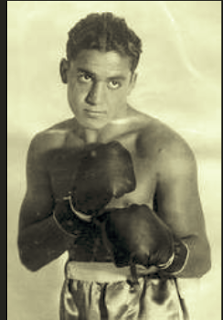
Today is Yom Hashoah, when Jews reflect on the six million Jews murdered by the Nazis. The Holocaust is commonly treated as a European catastrophe, but Nazism had an impact on North Africa where Jews were stripped of their rights and some sent to labour camps. Several hundred Libyan Jews were deported to Bergen-Belsen. Some 2,000 Jews born in Arab countries and living in Europe perished in the death camps. Here is an extract from a new book, Uprooted by Lyn Julius:
Victor ‘Young’ Perez, Tunisian-born boxing champion, was deported from France and died on the Death March from Auschwitz in 1945.
The Nazis incorporated the Jews of the French Maghreb in their extermination plans at the January 1942 Wannsee conference. The statuts des juifs – stripping Jews of their French citizenship, seizing property and bank accounts and expelling Jews from state schools, universities and the professions – were implemented in Morocco and Algeria under Vichy rule.
Tunisia was occupied by the Nazis for six months from November 1942 under the leadership of SS Commandant Walter Rauff, the inventor of the mobile gas van. Rauff had been responsible for the deaths of over 90,000 Jews in Eastern Europe. But Nazi plans for the extermination of the Jews – the Einzatsgruppen Ägypten death squad was standing by in Greece – were thwarted by the Allied victory over General Rommel at El-Alamein in October 1942.
Nonetheless, beginning on 9 December 1942, some 5,500 male Jews – some as young as 17 – were rounded up and sent to labour camps. Jewish property was pillaged and hefty fines imposed on the community ‘to pay for the damages caused by Allied bombing’.Scores were killed. Jewish eye-witnesses claim that the Germans had begun building gas chambers in Tunisia: had the Americans not recaptured the country in May 1943, the extermination of the Jews would have been underway two months later.
In 1938, Italian racial laws came into force in Libya. Some 600 Libyan Jews died from starvation and typhus in the country’s notorious Giado camp. Around 870 Libyan Jews of British nationality were deported to Bergen- Belsen, though the majority are thought to have survived. Legend has it that the Moroccan sultan, the future Mohamed V, saved Moroccan Jews from being deported to concentration camps in Europe: but deportation across the Mediterranean was never a realistic possibility.
The philo-Semitic sultan famously declared: ‘ There are no Jews, only Moroccan subjects’. It might be fair to say that he may have prevaricated, but he did not fail to sign every single Vichy anti-Jewish decree: Jews were shunted back into the teeming Jewish ghettoes from the European quarters of Moroccan cities, they were forbidden to employ Muslim maids, and as in Algeria and Tunisia, an inventory of Jewish property was drawn up, quotas were instituted in schools and universities and Jews excluded from public service and the professions. The sultan was branded, in a recent feature, ‘just but powerless’ by the Moroccan medium Tel Quel . Real power lay with the French Resident-General.
Servicemen of the defeated French army, together with political prisoners from Spain, were sent by the Vichy regime to thirty forced labour camps on the Moroccan-Algerian border. They included 2,000 European Jews interned at the Bergent camp. Dozens died from starvation, torture and neglect in the camps, as they built the Trans-Sahara railroad. The Moroccan sultan raised not a single objection.
The governments of Egypt and Iraq were pro-British and tens of thousands of Muslims served in the British and Free French armies – but popular feeling was largely pro-Nazi in the Arab world. In his diary Walter Rauff described the Tunisian Arabs as ‘depressed’, the Jews ‘hopeful’ at the Allied advance in early 1943. A majority of Egyptians supported the Germans.The Jews of Alexandria fled to Cairo, and the Jews of Cairo moved to the old quarter of Fostat. They watched with trepidation as the front line between Egypt and Libya shifted back and forth during 1941. In Morocco, Jews were subject to mob attacks as soon as General Patton’s troops landed in late 1942 (Operation Torch).
Albert Memmi remembers the atmosphere before the Allies recaptured Tunisia from the Nazis in May 1943:
“I have described in Pillar of Salt how the French authorities coldly left us to the Germans. But I must add that we were also submerged in a hostile Arab population, which is why so few of us could cross the lines and join the Allies. Some got through in spite of everything, but in most cases they were denounced and caught.”

Leave a Reply